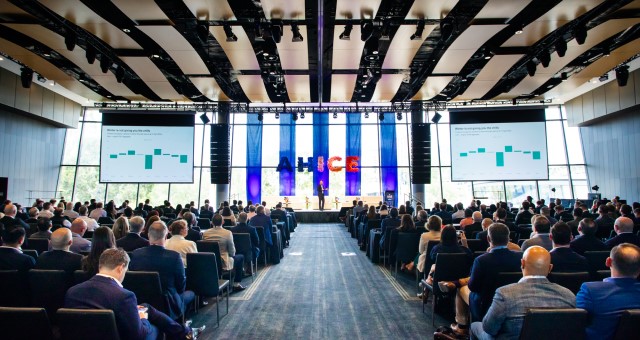Fifteen years ago, 300 delegates assembled in Sydney’s Four Seasons Hotel to listen to the prognostications of 30 revered members of the hospitality industry.
This week, 15 years on, 1500 delegates from 40 countries were in attendance for the 15th edition of the Asia Pacific Hotel Industry Conference and Exhibition (AHICE), Design Inn Symposium and the Future Leaders Forum. While many of those original executives were in attendance, more than 200 were first-time attendees.
Such has been the skyrocketing status of the event that the speaker lineup now includes the Premier of host state South Australia, the Hon Peter Malinauskas MP – or ‘Mali’ as he became known to delegates – and Minister for Tourism, the Hon Zoe Bettison MP; alongside global hotel heavyweights such as IHG Hotels and Resorts Chief Executive Officer – Europe, Middle East, Asia and Africa, Kenneth Macpherson; Accor Premium, Midscale and Economy Brands Global Chief Development Officer, Camil Yazbeck; and Radisson Hotel Group Global Head of Development, Elie Younes.
Unsurprisingly, the rising cost of construction was raised in several panel discussions.
JLL’s Ross Beardsell Development Outlook panel lamented several of the hurdles facing developers looking to create new stock domestically, while the wider Asia Pacific market is opening new hotels on an almost daily basis. With construction costs rising at 5%pa, the option to convert existing real estate to hotels from underperforming commercial was raised numerous times over the two days.
High profile investor, Dr Jerry Schwartz said, “Not only is construction harder, so are approvals. These can take years.”
Another topic that presented as a consistent thread, was the emerging option of Build To Rent (BTR), a discussion which kicked off Day 2 under the moderation of Baker McKenzie’s Sebastian Busa.
Hotel Capital Partner’s Lucia Grambalova, is clearly ahead of the curve on this topic, but cautioned “BTR can be difficult and still needs more governmental support.”
Emma Fraser later quizzed her panel on the subject of apartments, co-living and branded residential. As another emerging development option, this arena is clearly poised to make bigger inroads in the accommodation sector.
Accor’s Lindsay Leeser was optimistic given the French giant’s recent opening of the mixed-use Mondrian on the Gold Coast. “Long stay is a continuing trend and with Mondrian and (soon) the Pullman Launceston is an opportunity which I believe we’ll see more of.”
The heritage-listed former TAFE building and a neighbouring 1950s building will become a mixed-use precinct including apartments and restaurants.
Another consistent ‘hot button’ was the topic of Japan. The yen has been steadily falling, losing more than a third of its value since 2021, thus opening the tourism floodgates.
The country is front of mind for everyone from investors to travellers and the big brand talent scouts. Once dominated by independent properties, both major and mid-level players are now quickly filling the vacuum with franchises and management agreements.
JLL’s Adam Bury quizzed his Asia Pacific Investment panel’s heavy hitters on the question of Japan. Paul Slater was quick to contribute, adding simply, “Japan is where all the capital wants to be.”
As a follow on from the Design Inn symposium, sustainability was another topic that brought out much spirited and impassioned discussion.
While Enzyme’s Andrew Cameron’s panel of ESG specialists were quick to estoll the virtues of their own specific activities in this field, Kylie Roberts-Frost of the Bedding Stewardship Council, levelled the conversation by observing, “we need to change the conversation from simply recycling to the whole value chain. As consumers we can really drive change, move past greenwashing and properly implement circularity.”
When the Covid lock-downs ceased so suddenly, it instantly put pressure on all hotels’ human resources, a hangover that persists to this day. Enticing staff, particularly graduates, back to the hospitality industry has been cited across several panel discussions.
Associate Professor Simon Pawson from the Blue Mountains International Hotel Management School has been an invaluable contributor to numerous discussions during the lifetime of AHICE. Again, he was asked to confront this issue as moderator of the ‘Power of the People’ panel.
“Why are school leavers turning away from the hospitality industry as a career choice?” he asked.
The lively discussion covered numerous aspects with EVT’s Silvia Cohen citing the decline in mental health as a factor.
“With the year-on-year decline of mental health, hotels need to invest in the well-being of staff and upskill managers to implement and maintain relevant programs.”
IHG’s Joan Blindheim agreed, stating, “Leaders are responsible for staff wellbeing, and they are not always equipped to deal with such matters.”
Clearly, this open-ended topic will reverberate for some time as the industry realigns human resource culture.
Numerous panels touched on the implementation of Artificial Intelligence (AI) into daily routines, particularly IP Protect’s Richard Munro, whose Asset Managers’ Outlook panel met the challenge head-on.
Again, the wisdom of Lucia Grambalova shone through. “With data analysis, AI can streamline non-customer facing tasks and make the overall guest journey more efficient.”
And if we needed any further wake-up calls to this revolutionary technology, Stephen Borg from meldCX astonished the room with his keynote speech, ‘The World of AI”. His so-called ‘Omnichannel Experience’ with Viana software will gather actionable customer and business insight and is set to transform how hoteliers implement and monetise valuable space in their properties.
In the next issue of HM, we will delve deeper into the AHICE discussions, touching on new trends in F&B, the continued rise of White Label, news from New Zealand, Fiji and the South Pacific and much more.

